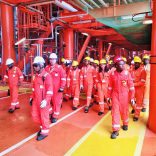Sasol, communities and government enter a new cycle of Local Development Agreements (LDAs-II)
Government bolsters control of fuel business

Noticias (File photo) / For illustration purposes only
The Mozambican State and the Swiss company SICPA-SA have signed a two-year contract for the marking of fuels circulating in the national territory.
The measure aims to curb tax evasion in the import and marketing of petroleum products, which have resulted in huge losses of revenue for the country. The signing took place last week in Maputo.
Moisés Paulino, national director of hydrocarbons and fuels in the Ministry of Mineral Resources and Energy (MIREME), told journalists that the marking would start at the beginning of next year and would be done at the terminals at the moment of importation.
The aim is to differentiate fuel imported for domestic consumption from fuel in transit which is not subject to the payment of customs duties.
“As a government, we are sure that there is tax evasion. There is a segment of fuel that was supposed to go to the market in the region, and for that reason is applied reduced rates, but that gets back to the domestic market and is sold illegally. On the other hand, there is adulteration of products, and we intend to eliminate both these situations,” he said.
Paulino said that the country spends about US$600 million annually on imports of fuels.
“Because the sale of fuel for domestic consumption is in some cases subsidised by the state, the unmarked product has entered a circuit not controlled by the government and was therefore sold in neighbouring countries such as Zimbabwe and South Africa,” he said.
Miguel Nhane, general coordinator of fuel sealing and marking at the Tax Authority of Mozambique (AT), said the mark wold raise fuel tax revenues from 10 to 14 percent. “That is, if the measure were to start this year, we would have an increase in fuel tax revenues from 18.6 billion to 26.04 billion meticais”
“It is enough to say that even internally there are imports destined for consumption in specific subsidised sectors such as agriculture, fisheries and some industries, but that it ends up being used by mega-projects negatively affecting the socio-economic development policies of the country.”












Leave a Reply
Be the First to Comment!
You must be logged in to post a comment.
You must be logged in to post a comment.